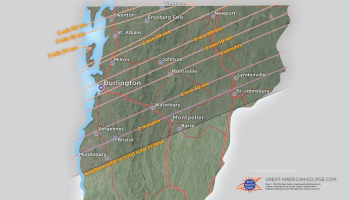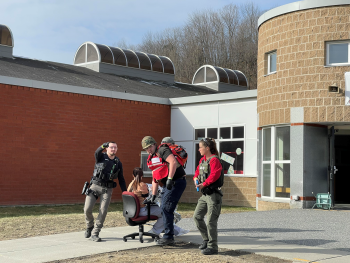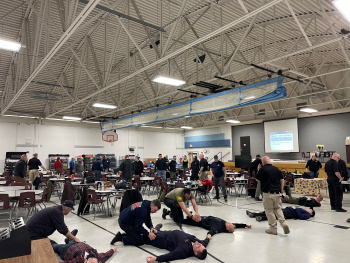
March, 2024
Volume 18 Issue 3
**Best viewed on a computer browser or horizontally if you are on a smartphone**
Eclipse Planning

Vermont is less than a month from the April 8, 2024 total solar eclipse. This unique event is expected to draw 50-200 thousand visitors to that area for the day.
The state of Vermont has established a website with eclipse information: www.vermont.gov/eclipse. This includes safety information, viewing guidance, events, and where to find traffic and weather information on the day of the event. Please share this resource with those in your town.
The state and local governments will use Vermont Alert for notifications; visit www.vtalert.gov to register.
The state has also established a dedicated text notification system for the event to convey weather, traffic, and other information; text VTECLIPSE to 888777 to register.
Traffic will be heavy that day, particularly in areas where weather and geography offer the best view of the eclipse. Municipalities should plan for traffic, parking (both legal and illegal), and possible stress on emergency services. The impact on public lands during mud season, wildfire risks, and more are other planning considerations.
The Vermont League of Cities and Towns is hosting a series of webinars to prepare municipal governments for the event. Town officials can visit https://www.vlct.org/events/EclipsePlanning2024 for information and registration information.
A partial solar eclipse will begin at 2:14 p.m.; at 3:26 p.m., a total eclipse will darken Vermont's daytime sky, lasting about 3 minutes. The phenomenon will continue as a partial eclipse until 4:37 p.m. The area impacted by the eclipse will be an east-to-west line from St. Johnsbury, Barre, and Middlebury north to the Canadian border. A map of the area can be found at: https://www.vermont.gov/eclipse#eclipse-map
Vermont Receives Disaster Declaration for December 18-19 Storm
President Joseph Biden has signed a Major Public Assistance disaster declaration for seven Vermont counties to assist communities in recovering costs for the repair of public infrastructure damaged by severe storms and flooding on December 18-19, 2023. The declaration covers Essex, Lamoille, Orange, Orleans, Rutland, Windham, and Windsor counties.
Cities and towns in the declared counties now qualify for 75% reimbursement of recovery costs arising from the storm under the Federal Emergency Management Agency Public Assistance Program. Eligible costs include debris removal, road and public building repairs, staff overtime responding to and cleaning up after the storm, and contractor assistance.
State and Federal assessors identified more than $1.9 million in storm-eligible costs during a Preliminary Damage Assessment in December, although the final tally will likely be higher statewide.
Applicant briefings will be held for those towns seeking reimbursement; those will be held in person and online.
March 7 & 11, 9:00 a.m.: Online (contact Kim.canarecci@vermont.gov for information)
March 13, 10:30 a.m.: Vermont Agency of Transportation District Office, 224 Beswick Drive, White River junction
March 14, 10:30 a.m.: Vermont Agency of Transportation Office, 61 Valley View Suite #2, Mendon
The state expects to make a request for the January 9 – 13, 2024 storm in the coming days.
Governor Scott Requests Major Disaster Declaration for January Storms
Governor Phil Scott has made a formal request to President Joe Biden for a Major Disaster Declaration to help communities and public utilities in Chittenden, Essex, Franklin, Lamoille, and Orleans counties recover costs for repair of public infrastructure damage caused by damaging storms from January 9 – 13, 2024.
If granted, a federal Major Disaster Declaration unlocks Federal Emergency Management Agency Public Assistance Program funding to reimburse municipalities and public utilities for 75% of eligible costs like power restoration, debris removal, road and public building repairs, and staff overtime responding to and cleaning up after the storm.
Federal assessors identified more than $2.3 million in costs incurred by public entities statewide for repairs to public infrastructure. This figure nearly doubles the minimum program-eligible costs ($1.2 million) the state must show to qualify for a Public Assistance disaster declaration.
Storm-related costs in Chittenden, Essex, Franklin, Lamoille, and Orleans counties exceeded the minimum per-capita amount they must show to qualify.
The declaration request also seeks funds from the Hazard Mitigation Grant Program (HMGP). That funding can be used to provide 75% reimbursement for projects anywhere in the state that reduce the likelihood of damage to public infrastructure in future disasters.
The request was sent to the Federal Emergency Management Agency, which will review and then send to President Biden with a recommendation for a final decision.
$69M Available for Hazard Mitigation Grant Program
At least $69 million is available through FEMA's Hazard Mitigation Grant Program, managed by Vermont Emergency Management, to support natural hazard mitigation in Vermont after the July 2023 flooding. Funding is for projects and planning to reduce the future risk of flooding, landslides, or other natural hazards; proposed projects need not have been flooded in the July 2023 storm. Pre-applications are due by June 21, 2024. Early applications are strongly encouraged so we can provide support on application development. See the attached notice of funding for additional information.
- Eligible to Apply: State agencies, Regional Planning Commissions, municipalities, other government entities, and in some cases private non-profits. Note: Municipalities must have an approved Local Hazard Mitigation Plan prior to receiving a project award.
- Funding Available: $69 million (federal share) specifically for Vermont.
- Eligible Projects Include:
- Flood-vulnerable buyout and structural elevations
- Natural resource projects such as floodplain restorations or dam removals
- Infrastructure projects such as upsizing bridges or culverts
- Floodproofing of municipal or commercial buildings
- Road relocation, road elevations, or soil stabilization
- Management Costs: 5% of total project costs may be available for awarded projects to manage the grant award. This portion is 100% federally funded.
- Cost Share: 75% federal, 25% local non-federal (cash and/or in-kind).
Flood Elevations
Flood elevations and mitigation construction are eligible under the Hazard Mitigation Program mentioned above and are a good way of maintaining available housing and tax base:
- Qualifying Structures:
- Residential and non-residential.
- Have a history of damages from flooding (including structures determined to be Substantially Damaged by a local zoning/floodplain administrator), OR
- Located in a Special Flood Hazard Area as defined by FEMA. Note: past damage is not required.
- Elevations: Must be structurally sound and capable of being elevated safely.
- Mitigation Reconstruction: For existing structures and/or foundations that have been partially or completely demolished or destroyed in a flood.
- Municipalities Apply on behalf of Property Owners: A jurisdiction wherein the structure is located must be willing to submit the application and manage the grant funding.
- Match Commitment: Generally, there is a required 25% non-federal match; however, the non-federal match may be lower and State-funded match may be available.
- Elevation Requirements Prior to Construction Funding: Elevation Certificate, structural inspection by qualified professional, and engineered design showing the building is fit to be elevated and would meet or exceed local flood regulations.
- Mitigation Reconstruction Requirements Prior to Construction Funding: Substantial Damage determination and engineered design showing that the project would meet or exceed local flood regulations.
- Flood Insurance: Following the elevation, flood insurance is generally required on the structure in perpetuity.
To learn more, please visit Vermont's Disaster Based Funding page. To express interest in any mitigation projects, please reach out directly to dps.hazardmitigation@vermont.gov.
The priority deadline for expressing interest in a mitigation project is Friday, March 29, 2024. The final deadline is Friday, June 21, 2024.
For more information on elevations and mitigation reconstruction, please visit https://vem.vermont.gov/funding/mitigation/structure-elevations-mitigat….
VEM Training Cancellation Procedure
Vermont Emergency Management coordinates or hosts dozens of training sessions throughout the year. These sessions are spread out around the state, and some are offered online.
Adverse weather sometimes impacts in-person courses, as degraded travel conditions limit the ability of instructors and participants to reach the class location. VEM strives to reach all participants of a cancellation to avoid unnecessary travel.
To ensure consistency, VEM has adopted a Cancellation Procedure that outlines the procedures we'll follow to cancel/turn an event into a virtual event and how individuals will be notified about the cancellation.
Should there be a cancellation, participants will be notified at least four hours before the scheduled start time. Those registered for a training session should check the email with which they registered for the course before traveling to the site.
Please share this information with colleagues.
Active Threat Integrated Response Course
From Vermont Emergency Management Training Coordinator Hillarie Scott:
Last week at Barre City Elementary and Middle School, Fire, EMS, and Police from all over Vermont came together for the Active Threat Integrated Response Course (ATIRC). This was a three-day course that improved the integration between law enforcement, fire, and emergency medical services (EMS) in active shooter events.
We'd also like to thank students from Norwich University's Criminal Justice program for coming and being the actors for the live scenarios.
If you would like to bring this class to your area, please reach out to Hillarie Scott at hillarie.scott@vermont.gov


HSEEP Bootcamp
Homeland Security Exercise and Evaluation Program Exercise Bootcamp will be held in Vermont this summer. The purpose of the course is to reinforce prior exercise management training and to coach emergency managers through the planning, conduct, and evaluation of a tabletop exercise.
The course is divided into four modules, each focusing on a different aspect of the exercise management process, with a combination of classroom instruction and individualized engagement between students and instructors. The modules are:
• Module 1: Scoping
• Module 2: Design and Evaluation Planning
• Module 3: Preparing for Conduct
• Module 4: Post-Conduct (AAR and Beyond)
LOCATION: Virtual
DATE/TIME:
Day 1- June 14, 2024, 8:30 a.m.- 12:30 p.m.
Day 2- July 12, 2024, 8:30 a.m.- 12:30 p.m.
Day 3- August 9, 2024, 8:30 a.m.- 12:30 p.m.
REQUIRED: Conduct your tabletop exercise between August 10th and October 1st
Day 4- October 11, 2024, 8:30 a.m.- 12:30 p.m.
PREREQUISITES: L0146 Homeland Security Exercise Evaluation Program (HSEEP), Previous participation in an exercise (as document by a sign-in sheet and accompanying brief narrative describing the student’s role in the exercise(s))
REGISTRATION: via State Learning Management System: https://vermont.csod.com/ui/lms-learning-details/app/event/42d3f758-b37…
Must attend all four days to receive credit.
Training
Most trainings require a Learning Management System(LMS) account. If you don’t have an account, you can register for one at the following link: https://vermont.csod.com/selfreg/register.aspx?c=%255e%255e%255eQGm2wxcSUvINsXvXjRYs1A%253d%253d
For a complete listing of trainings go to the Events Calendar in the LMS: https://vermont.csod.com/LMS/catalog/EventsCalendar.aspx?tab_page_id=-10&tab_id=20000513#m=2&d=03/08/2023
VT- Alert Manager Training: This training is now an anytime training in the LMS. We will still host the virtual live training. You can take this training at the following link on the LMS: https://vermont.csod.com/ui/lms-learning-details/app/video/588bdf66-6e68-490e-aa8b-18ccdd115184
Training Schedule
March 2024
MGT - 417: Crisis Management for School-Based Incidents for Key Decision Makers
LOCATION: Manchester Community Library, Manchester, VT
DATE/TIME: March 14, 2024, 8:00 a.m.- 4:00 p.m. & March 15, 2024, 8:00 a.m.- 3:30 p.m.
REGISTRATION: Rural Domestic Preparedness Consortium (RDPC)
and
LOCATION: Southwest Technology Center, Bennington, VT
DATE/TIME: March 18, 2024, 8:00 a.m.- 4:00 p.m. & March 19, 2024, 8:00 a.m.- 3:30 p.m.
REGISTRATION: Rural Domestic Preparedness Consortium (RDPC)
The purpose of this 2-day management/planning level course is to provide the operational-level details to support many of the topics covered in the U.S. Department of Homeland Security (DHS) approved AWR 148: Crisis Management for School-Based Incidents – Partnering Rural Law Enforcement and the Local School Systems awareness-level course. Rural schools, law enforcement, other emergency responders, and community stakeholders are often limited in their access to resources, so it is imperative that all potentially affected parties collaborate in planning, preparation, communication, response, and recovery in the event of a school-based incident. Moreover, these affected parties must come together to practice their interoperable skills through drills and exercises to ensure the strategies in place provide for effective crisis response and collaborative recovery. With the intent of building upon the foundation of the AWR 148 course and utilizing an all-hazards approach, this two-day course will provide content instruction, develop concept-specific skills, and provide opportunities for law enforcement, school personnel, and community stakeholders to collaboratively apply the course objectives in scenario-based applications.
Vermont Local Emergency Management Director Course
LOCATION: Hybrid. This will be virtual in and in person at Londonderry Volunteer Rescue Squad, Londonderry, VT
DATE/TIME: March 28, 2024, 8:00 a.m.- 4:00 p.m.
REGISTRATION: State Learning Management System
This course will familiarize Local Emergency Management Directors (EMD) and Coordinators (EMC) with major roles, responsibilities, and “how to do it” guidance, across all four phases of Emergency Management.
April 2024
VT- Alert Manager Training
LOCATION: Virtual
DATE/TIME: April 17, 2024, 1:00 p.m.- 2:30 p.m.
REGISTRATION: State Learning Management System
This training is intended for Town Officials who use VT-Alert for public notifications. This class is required for all people who will be using the program at the manager level. This training can also act as a refresher as needed. The class will be approximately 1.5 hours long and consist of sending live test alerts. A computer and internet connection are required. A second computer monitor is highly suggested as there is a follow along portion to the class. Prior to the training please confirm that your town has the required VT-Alert adoption paperwork. If you are unsure please contact dps.vtalert@vermont.gov
L0146 Homeland Security Exercise & Evaluation Program (HSEEP)
LOCATION: Newport District Office, Newport, VT
DATE/TIME: April 17-18, 2024, 8:00 a.m.- 4:30 p.m.
PREREQUISITES: IS-120
REGISTRATION: via State Learning Management System
The Homeland Security Exercise and Evaluation Program (HSEEP) course provides a comprehensive overview of exercise design and practical skill development. Using the same terminology and processes, this course will provide activities that will give participants an opportunity to interact with many of the templates and other materials that the National Exercise Division provides to ensure exercises are conducted in a consistent manner. Anyone who will be a member of an exercise design team or fulfill a role in one of the following areas of the exercise design process: design, development, conduct, evaluation or improvement process for exercise. The primary audience for the course is training officers, exercise managers, persons that will utilize the exercise and evaluation system and persons interested in becoming an HSEEP Evaluator for Vermont Emergency Management.
L0105- Public Information Basics
LOCATION: DPS Headquarters- Waterbury, VT
DATE/TIME: April 23-25, 2024, 8:00 a.m. – 4:30 p.m. each day
PREREQUISITES: IS-29
REGISTRATION: State Learning Management System:
This course will equip participants with the skills needed to be full or part-time PIOs, including oral and written communications, understanding and working with the media, and basic tools and techniques to perform effectively as a PIO, both in the proactive/ advocacy times and crisis/emergency response.
June 2024
State Emergency Operation Center Orientation
LOCATION: DPS Headquarters, Waterbury, VT
DATE/TIME: June 4, 2024, 1:00 p.m.- 3:30 p.m.
PREREQUISITES: ICS-100 and WebEOC Sate User Training
REGISTRATION: State Learning Management System
The purpose of this training is to provide an overview of the State Emergency Operations Center. This course is ONLY available to those who staff the Vermont State Emergency Operations Center.
August 2024
G0191- ICS/EOC Interface
LOCATION: Manchester Community Library, Manchester, VT
DATE/TIME: August 13, 2024, 8:00 a.m.- 4:30 p.m.
PREREQUISITES: IS-100, IS-200, IS-700, and IS-800
REGISTRATION: State Learning Management System
This course provides an opportunity for participants to begin developing an effective interface between the Incident Command System (ICS) and the Emergency Operations Center (EOC) for their community by applying Incident Command System (ICS) principles. This course reviews ICS and EOC responsibilities and functions and depends heavily on exercises and group discussions to identify interface issues and develop solutions. As part of the course, these concepts are then applied to exercise situations.
VT- Alert Manager Training
LOCATION: Virtual
DATE/TIME: August 14, 2024, 1:00 p.m.- 2:30 p.m.
REGISTRATION: State Learning Management System
This training is intended for Town Officials who use VT-Alert for public notifications. This class is required for all people who will be using the program at the manager level. This training can also act as a refresher as needed. The class will be approximately 1.5 hours long and consist of sending live test alerts. A computer and internet connection are required. A second computer monitor is highly suggested as there is a follow-along portion to the class. Prior to the training, please confirm that your town has the required VT-Alert adoption paperwork. If you are unsure, please contact dps.vtalert@vermont.gov
ICS 300- Intermediate ICS for Expanding Incidents
LOCATION: DPS Headquarters- Waterbury, VT
DATE/TIME: August 20-22, 2024, 8:00 a.m. – 4:30 p.m. each day
PREREQUISITES: ICS-100 and ICS- 200
REGISTRATION: State Learning Management System
This course focuses on the management of expanding incidents. It is intended for those who will be serving in the following positions: command staff, section chiefs, strike team leaders, unit leaders, division and group supervisors, branch directors, multi-agency coordination system staff, and Emergency Operations Center staff. This course is for middle management, strike team leaders, task force leaders, unit leaders, division and group supervisors, branch directors, and Emergency Operations Center staff.
September 2024
2024 Vermont Emergency Preparedness Conference
LOCATION: Lake Morey Resort, Fairlee, VT
DATE/TIME: September 10-11, 2024
REGISTRATION: Details to come

